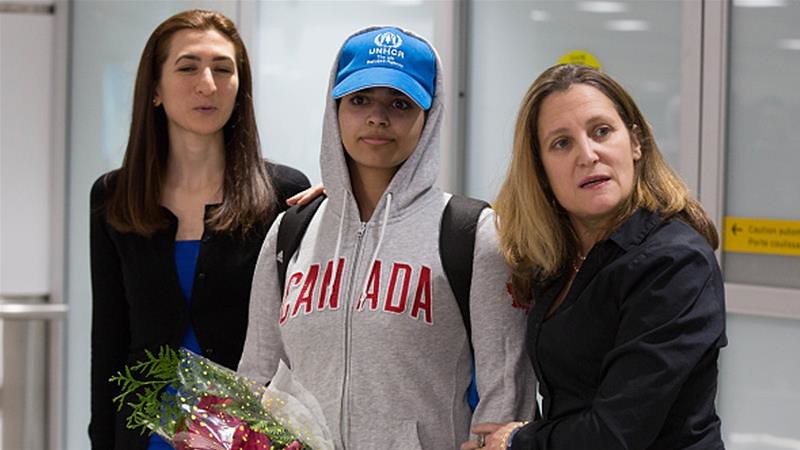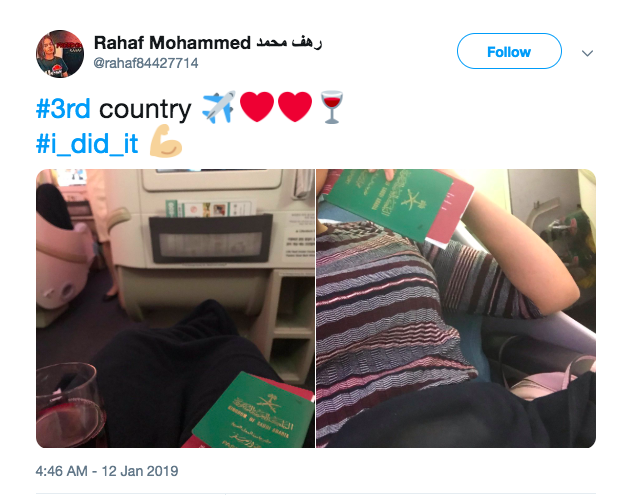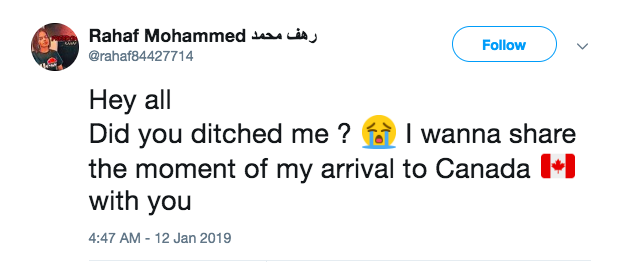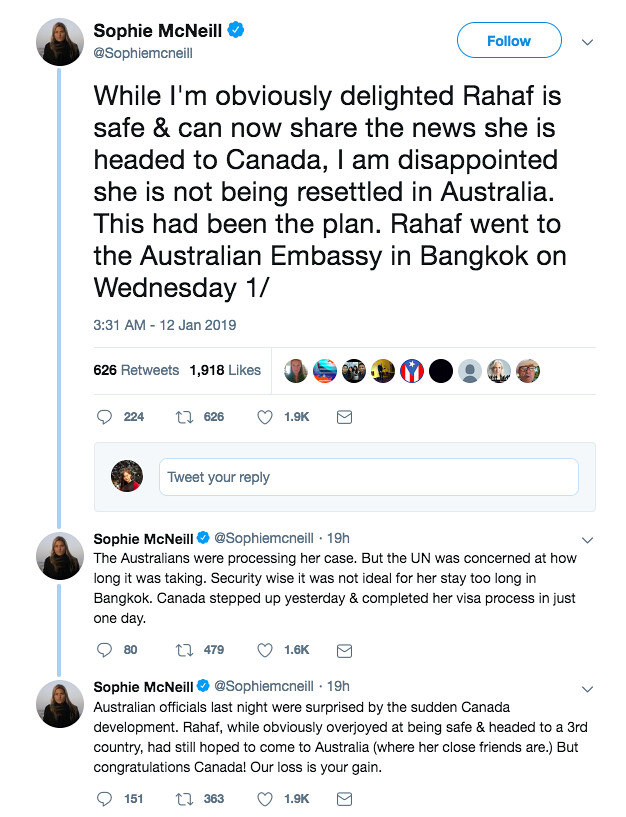Following an international campaign to stop her deportation and an intervention by the UNHCR, Rahaf Mohammed al-Qunun has been granted refugee status and has arrived in Canada.

Rahaf is welcomed at Toronto's Pearson International Airport by Chrystia Freeland (right), the Canadian Minister of Foreign Affairs
Ms Mohammed al-Qunun, 18, had fled alleged domestic abuse from Saudi Arabia. She arrived at Suvarnabhumi Airport on Sunday (5 January), originally en route to Australia, where she intended to seek asylum. She was then stopped in Bangkok, reportedly by Saudi diplomats. Realising that she was going to be forced to board a Kuwait Airlines flight and returned to her family, Rahaf barricaded herself inside an airport hotel room and tweeted about her situation. The hashtag #SaveRahaf trended globally overnight, sparking an international social media campaign and appeals from human rights groups to stop the Thai authorities from deporting her to Saudi Arabia, where she would be at risk not only of further domestic abuse but also of prosecution for renouncing Islam – a crime punishable by death under Saudi law.
On Monday (7 January) evening, after the Thai authorities had a change of heart, UNHCR representatives were finally allowed to see Rahaf. She was taken out of the airport on Monday night and remained in the care of the UNHCR while her case was assessed.
In a surprising turn of events, it was announced that Rahaf is to be resettled in Canada. Canadian Prime Minister Justin Trudeau confirmed that Canada has granted her asylum. He told reporters that, despite a strained relationship with Saudi Arabia, “Canada has been unequivocal that we will always stand up for human rights and women’s rights around the world. When the UN made a request of us that we grant Ms al-Qunun asylum, we accepted.” Rahaf's Twitter account, which was temporarily deactivated due to the number of death threats she was receiving, confirmed that she is now on a flight, and said that she wants to "share the moment of [her] arrival to Canada with you.”
"Where we can save a single woman, a single person that's a good thing to do."
She left Bangkok late on Friday (11 January) night and has now arrived in Canada. Al Jazeera reported that she was welcomed at Toronto's Pearson International Airport by Chrystia Freeland, Canada's Minister of Foreign Affairs, who said that Rahaf "is a very brave new Canadian." Freeland also said that the decision to accept Rahaf's asylum request was part of Canada's "policy of supporting women and girls around the world."
"It's obvious that the oppression of women is not a problem that can be resolved in a day, but rather than cursing the darkness we believe in lighting a single candle," she said. "Where we can save a single woman, a single person that's a good thing to do."


Rahaf’s resettlement to Canada came as a surprise to Australian officials, said ABC reporter Sophie McNeil on her Twitter account. Marise Payne, the Australian Minister of Foreign Affairs, confirmed at a press conference on Thursday (10 January) that the UN had referred Rahaf’s case to Australia and that her application was being processed. However, McNeil, who has been an advocate for Rahaf from the beginning, said that Rahaf went to the Australian Embassy in Bangkok on Wednesday, but the process was taking a long time and “security wise it was not ideal for her to stay too long in Bangkok”. The UN then turned to Canada, who completed Rahaf’s visa process within one day.

"Refugee protection today is often under threat and cannot always be assured, but in this instance international refugee law and overriding values of humanity have prevailed", said Filippo Grandi, the UN High Commissioner for Refugees. Thailand has, for quite some time now, been the subject of international criticism for its problematic treatment of refugees and asylum seekers. The kingdom is a party to the Convention against Torture and Other Cruel, Inhuman or Degrading Treatment or Punishment, Article 3 of which prohibits the return of a person to a state where they would be in danger of being subjected to torture or other serious human rights violations. The principle of non-refoulement is also recognised as part of customary international law. Nevertheless, the Thai authorities have, on numerous occasions, returned asylum seekers to countries in which they would be in danger.
"Refugee protection today is often under threat and cannot always be assured, but in this instance international refugee law and overriding values of humanity have prevailed."
Rahaf’s story has brought attention to another asylum seeker also detained in Bangkok and threatened with deportation. In December 2018, acting on a disputed Interpol red notice issued by Bahrain, the Thai authorities arrested Bahraini footballer Hakeem al-Araibi. Mr al-Arabi is a recognized refugee and was traveling on refugee travel documents issued by Australia, where he has been granted permanent residency.
Currently, Mr al-Araibi is still in detention and faces an even greater threat of being returned to Bahrain, where he would be at risk of imprisonment, torture, and other serious human rights violations. Australian officials are reportedly working closely with the relevant agencies on his case, but it is still unclear whether he will be released.
Prachatai English is an independent, non-profit news outlet committed to covering underreported issues in Thailand, especially about democratization and human rights, despite pressure from the authorities. Your support will ensure that we stay a professional media source and be able to meet the challenges and deliver in-depth reporting.
• Simple steps to support Prachatai English
1. Bank transfer to account “โครงการหนังสือพิมพ์อินเทอร์เน็ต ประชาไท” or “Prachatai Online Newspaper” 091-0-21689-4, Krungthai Bank
2. Or, Transfer money via Paypal, to e-mail address: [email protected], please leave a comment on the transaction as “For Prachatai English”
